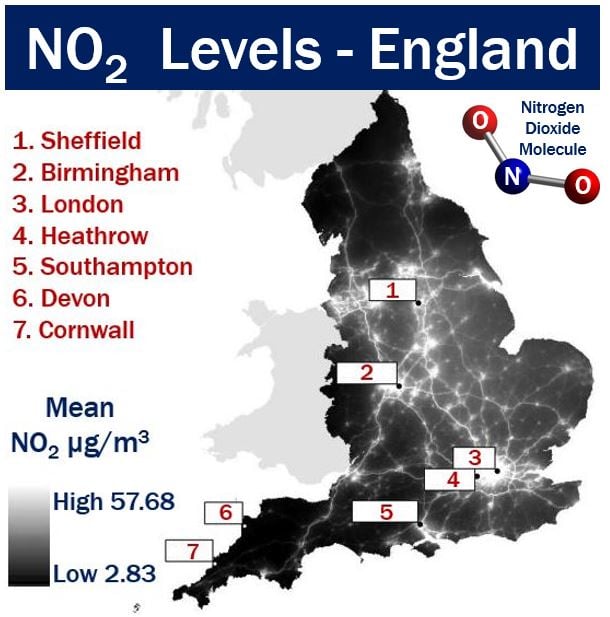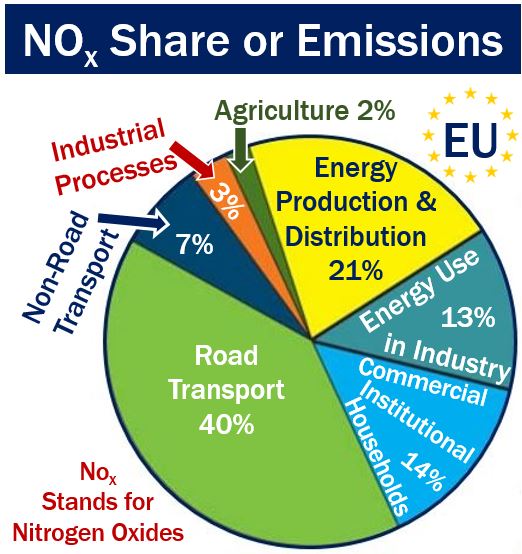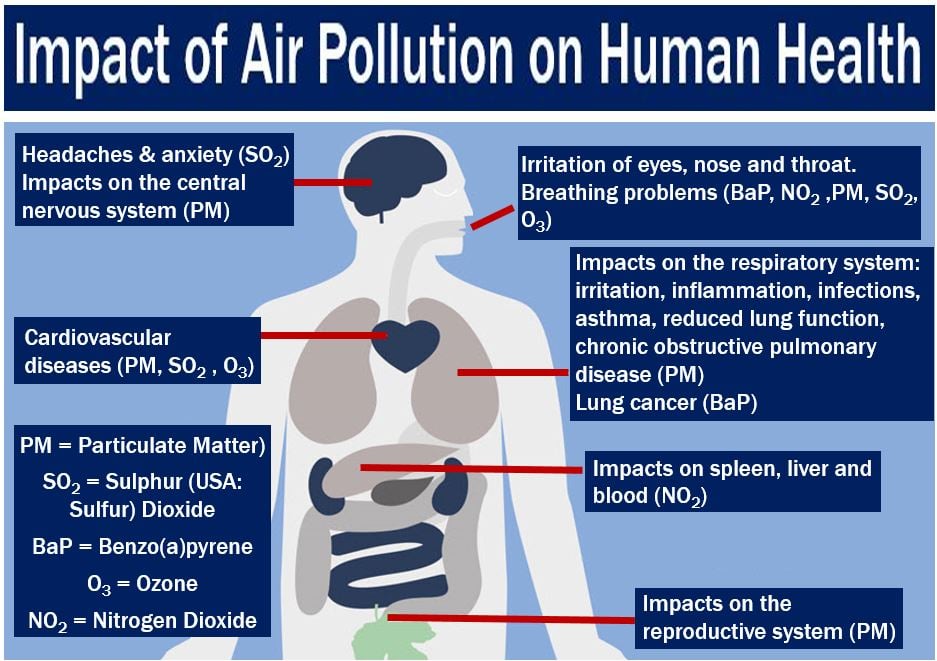Nitrogen Dioxide in the atmosphere can be as damaging to our wellbeing as the death of a partner, a relationship split-up, or losing a job, say researchers from the University of York in England.
PhD student Sarah Knight, and Peter Howley, a lecturer in Environmental Economics, wrote in an article – ‘Can Clean Air Make You Happy?‘ – that there is a ‘significant and negative association’ between life satisfaction and levels of atmospheric nitrogen dioxide, which causes lung problems. They wrote that these effects were substantive and comparable to the effects of many ‘big-hitting life events’.
Nitrogen dioxide – NO2 – is one of a number of nitrogen oxides. For humans, the most prominent sources of NO2 are diesel cars.
For their study, Knight and Howley analyzed and examined life satisfaction data from the UK Household Longitudinal Survey and the British Household Panel Survey, and compared it with air quality records from DEFRA (Department for Environment, Food and Rural Affairs).
 If all diesel cars in England were replaced with petrol (US: gas) ones, atmospheric nitrogen dioxide levels across the country would decline considerably, and people’s respiratory health would improve. (Image: from the article ‘Can Clean Air Make You Happy?)
If all diesel cars in England were replaced with petrol (US: gas) ones, atmospheric nitrogen dioxide levels across the country would decline considerably, and people’s respiratory health would improve. (Image: from the article ‘Can Clean Air Make You Happy?)
Reducing human exposure to NO2 would bring considerable benefits, the authors say, given that significantly more people are exposed to the gas than the number who end relationships or suffer unemployment.
UK nitrogen dioxide levels among highest in Europe
Levels of nitrogen dioxide are highest in London’s air, the authors wrote, while south-west England has the UK’s lowest levels. In fact, the British capital has the worst NO2 levels in the whole of Europe. In another study, Leicester was found to have the country’s highest nitrogen dioxide levels (see video at bottom of page).
At Marylebone Road, an important thoroughfare in central London, within the City of Westminster, annual mean nitrogen dioxide levels are more than double the legal EU limit.
Thousands of premature deaths every year across the European Union are caused by pollution from nitrogen oxides. UK, which has very high NO2 levels, suffers an especially high toll.
According to several studies, diesel vehicles emit approximately six times more nitrogen dioxide than allowed in official lab-based tests.
 The pie chart above shows that road transport and energy production/distribution were the main sources of NOx emissions in the EU in 2011. (Image: icopal-noxite.co.uk)
The pie chart above shows that road transport and energy production/distribution were the main sources of NOx emissions in the EU in 2011. (Image: icopal-noxite.co.uk)
In the paper the authors wrote:
“We find that NO2 is significantly related with subjective wellbeing, albeit much smaller in magnitude than previous estimates after controlling for a variety of important spatial controls. That being said, the effect size is substantive and comparable to that of many other widely studied determinants of subjective wellbeing.”
“For example, our standardized coefficients suggest that the effect of NO2 on life satisfaction is equivalent to approximately half that of unemployment, and equivalent to that of marital separation and widowhood, factors commonly associated with some of the largest wellbeing reductions in the literature to date.”
Regarding the UK Government’s plans for tackling diesel pollution, British Prime Minister Theresa May said during a recent trip to the Middle East:
“In relation to the issue of diesel cars, obviously we will be producing a new air quality plan, we’ve been required to do that by the courts.”
“But I’m very conscious of the fact that past governments have encouraged people to buy diesel cars and we need to take that into account when we’re looking at what we do in the future.”
According to the European Environment Agency (Document PDF file), 11,940 premature deaths in the UK in 2013 were caused by nitrogen dioxide exposure. Even though this was fewer than the 14,100 recorded in 2012, it still meant that Britain ranked second worst in Europe after Italy.
Modern diesel passenger cars emit ten times more toxins into the air than buses and heavy trucks, a new European study reported at the beginning of this year.
 This infographic shows the impacts on human health of common air pollutants. According to Community and Public Health, New Zealand: “Children, elderly people and those with respiratory diseases are more vulnerable to air pollution and areas of high deprivation have greater excess mortality from air pollution.” (Image: Adapted from cph.co.nz)
This infographic shows the impacts on human health of common air pollutants. According to Community and Public Health, New Zealand: “Children, elderly people and those with respiratory diseases are more vulnerable to air pollution and areas of high deprivation have greater excess mortality from air pollution.” (Image: Adapted from cph.co.nz)
At the end of 2016, the European Commission began legal action against the UK and other EU members, including Germany and Spain.
Elżbieta Bieńkowska, EU’s industry commissioner, said:
“Abiding by the law is first and foremost the duty of car manufacturers. But national authorities across the EU must ensure that car manufacturers actually comply with the law.”
In their article, Howley and Howley concluded:
“Our results suggest that the welfare effects, as proxied by subjective well-being, from NO2 can be substantive. For instance, our analysis suggests that the disutility experienced by NO2 may be broadly comparable to that of many major life events such as unemployment, separation and widowhood.”
“Moreover given that the effects of NO2 on life satisfaction are population-wide (i.e. to some extent everyone is exposed to NO2, whereas only a fraction of the population are unemployed or separated), this suggests that the benefits to society from any reductions in NO2 would be substantive.”
Video – Nitrogen oxide levels in Leicester
This University of Leicester video, released one year ago, claims that Leicester has the highest levels of nitrogen oxide in England. Health professionals in the city say that over the past fifteen years, they have seen a growing number of patients with breathing and lung problems.
